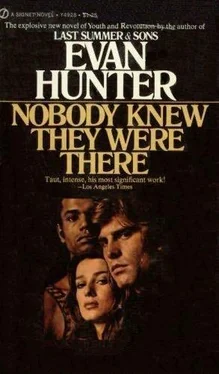Evan Hunter - Nobody Knew They Were There
Здесь есть возможность читать онлайн «Evan Hunter - Nobody Knew They Were There» весь текст электронной книги совершенно бесплатно (целиком полную версию без сокращений). В некоторых случаях можно слушать аудио, скачать через торрент в формате fb2 и присутствует краткое содержание. Город: New York, Год выпуска: 1971, ISBN: 1971, Издательство: Doubleday & Company, Жанр: Проза, на английском языке. Описание произведения, (предисловие) а так же отзывы посетителей доступны на портале библиотеки ЛибКат.
- Название:Nobody Knew They Were There
- Автор:
- Издательство:Doubleday & Company
- Жанр:
- Год:1971
- Город:New York
- ISBN:978-0094575004
- Рейтинг книги:4 / 5. Голосов: 1
-
Избранное:Добавить в избранное
- Отзывы:
-
Ваша оценка:
- 80
- 1
- 2
- 3
- 4
- 5
Nobody Knew They Were There: краткое содержание, описание и аннотация
Предлагаем к чтению аннотацию, описание, краткое содержание или предисловие (зависит от того, что написал сам автор книги «Nobody Knew They Were There»). Если вы не нашли необходимую информацию о книге — напишите в комментариях, мы постараемся отыскать её.
Nobody Knew They Were There — читать онлайн бесплатно полную книгу (весь текст) целиком
Ниже представлен текст книги, разбитый по страницам. Система сохранения места последней прочитанной страницы, позволяет с удобством читать онлайн бесплатно книгу «Nobody Knew They Were There», без необходимости каждый раз заново искать на чём Вы остановились. Поставьте закладку, и сможете в любой момент перейти на страницу, на которой закончили чтение.
Интервал:
Закладка:
“What snow on the tracks?” he asks. “We get them tracks cleared the minute there’s any snow. You didn’t see no snow on the tracks.”
“I thought I saw some.”
“Where? You saw snow? Where’d you see snow?”
“Out by the railroad bridge.”
“Over Henderson Gap?”
“That’s right.”
“No snow on that bridge, nossir. Clear those tracks first thing. Clear all the tracks first thing. Got this special locomotive comes through to clear the tracks. You didn’t see no snow on that bridge, mister. Nossir.”
“I thought if there was snow, it might delay the train. Be better off taking a plane, in that case.”
“Well, you want to take an airplane, that’s your business. But I can tell you right now we don’t get no trains delayed by snow.”
“But there could be a delay if there was snow on the tracks, isn’t that right?”
“Sure, but there ain’t never no snow on the tracks.”
“How long does it take a train to get from that bridge, anyway?”
“Which bridge? The one over the Gap?”
“That’s right”
“Thirty-two minutes from the eastern signal light to the station here.”
“But that’s only when there’s no snow on the tracks.”
“I'm telling you there’s no need to worry about snow on the goddamn tracks. Thirty-two minutes, rain or shine, that’s it You want a ticket, or don’t you?”
“No, I think I'll take an airplane.”
“Suit yourself,” he says.
I return the automobile, and then walk slowly back toward the hotel. I am bone weary from my day on the slopes, and cold besides. But I now know that the California train will be crossing the bridge at precisely 10:48 on November second, thirty-two minutes before it reaches the depot. The knowledge is reassuring. It gives me an exact time, it pinpoints the event, defines it, gives it reality and dimension. I cannot yet visualize myself depressing a plunger or lighting a fuse, those acts are yet beyond my ken. But I can visualize the eastbound express rattling across that bridge, and I can conjure a sudden explosion that sends cars hurtling to the ravine below, toppling in slow motion, car after car in endless succession. I walk slowly through the town. I am growing fond of this place. With my own death a distinct possibility, it is as though I have lived here all my life and am now idly passing my waning days in a familiar place. I think fleetingly of Sara. The streets are covered with yesterday’s snow. The bell tower begins tolling again. It is only five o’clock, but the tolling seems incessant. I quicken my pace. It is very cold, and I have begun to shiver.
In my room, I am reading the newspaper without enthusiasm when the telephone rings. I pick up the receiver.
“Hello?”
“Mr. Sachs?”
“Yes?”
“This is Seth Wilson.”
“Hello, Seth.”
“Do you remember me? Sara’s friend?”
“I remember you.”
“The spade writer,” he says.
I make no comment.
“How are you, Mr. Sachs?”
“Fine, thank you. What’s on your mind, Seth?” My manner is brusque and abrupt. I am still halfway convinced that he is in league with my follower — or is that only because they are both black? The question raises some interesting possibilities for internal dialogues, but I am too busy wondering why Seth is calling me now. Is it to check on whether or not I’m in? So that his partner can come over to shake the place down again? But if he’d wanted to search the room, he’d had ample opportunity to do so this afternoon while I was at Snowclad. I wait for Seth’s explanation. My attention is momentarily caught by a news item on page seven of the paper. It is the first good news I have read all day.
“Mr. Sachs,” Seth says, “I’m having a little get-together at my place tonight, and I was wondering if you’d like to join us. Just some of the kids, and some faculty people, it should be fun.” He pauses. “I thought you might like to stop by.” He pauses again. “Sara’s coming,” he says.
“I see.”
“In fact, it was she who suggested I give you a call, ask if you’d like to come.”
“I see.”
“So I’m asking,” he says. There is a definite shrug in his voice. “Do you think you can make it?”
“Maybe. What time will it be?”
“Oh, nine o’clock or thereabouts. Or whenever you want to come over. People’ll be dropping in and out all night long.”
“What’s the address?”
“720 North Harrington. It’s about seven blocks from your hotel. Nice brisk little walk.”
“I’ll try to get there.”
“It’s B.Y.O., Mr. Sachs.”
“Okay.”
“Well then, I hope to see you,” he says.
“Right, thank you.”
I hang up, and then look at the newspaper again.
The article appears at first to be only another tired story about the train. It has been labeled “the Peace Train,” the article reiterates, and the avowed purpose of its journey from Los Angeles to New York is “to unite men of good will.” It has occurred to me long before now that the organizers of this hand-shaking, slogan-spouting, cross-country tour have confused their catch phrases somewhat, since the trek is to begin shortly after All Hallows’ Eve rather than Christmas Eve, when the “Silent Night” theme might have been more appropriate. It has also occurred to me that the train itself might have been more accurately, if less cynically, named since the purpose of this jaunt is really to justify the war, rather than to end it
In fact, the contradictions inherent in the journey are manifold. They have claimed to the world that we are unified in our determination, and yet the trip has unification as its goal. They have supposedly convinced the people of the United States that their duly-elected representatives desire only world peace, and yet they now feel it necessary to travel three thousand miles across the nation to sell the idea all over again. There is schizophrenia in the air. They have squashed rebellion but now they fear it festers in the silence where their voices echo. All their tired reassurances cannot disguise the true purpose of this journey: to promote peace, yes, but only peace of mind, to still the doubts as effectively as they have stilled the clamor. Fear is the motivating force here, it can be sensed, it can be sniffed, the fear of embryo tyrants who suspect they may have gone too far, or perhaps not far enough. To disinfect this certain stench emanating from the top and seeping down to where it may once again stir the population into action, they have now made an announcement (and this is the only new and exciting thing about the newspaper article) designed to demonstrate their own sense of security.
The current news item clearly states for the first time that both of them will be on the train, prior commitments notwithstanding. From the beginning, of course, it was apparent that the notion of a whistle-stop train trip was politically archaic, clearly motivated only by a sure sense of showmanship. But they have now added daring to their theatricality. What better vote of self-confidence than to announce that they will both be on the train? No longer will merely one of them face the nation unafraid, oh no. So certain are they of those “men of good will” out there, so positive of unanimous approval that they will risk the trip together. The importance of this tour will take all precedence, they have solemnly announced. In Los Angeles, they will board the train in tandem on the evening of November 1, ride side by side like driver and shotgun on a hundred-percent American stagecoach as it wends its way (amid waving American flags, no doubt) to arrive in New York sometime during — I have forgotten to call Eugene in New York.
Читать дальшеИнтервал:
Закладка:
Похожие книги на «Nobody Knew They Were There»
Представляем Вашему вниманию похожие книги на «Nobody Knew They Were There» списком для выбора. Мы отобрали схожую по названию и смыслу литературу в надежде предоставить читателям больше вариантов отыскать новые, интересные, ещё непрочитанные произведения.
Обсуждение, отзывы о книге «Nobody Knew They Were There» и просто собственные мнения читателей. Оставьте ваши комментарии, напишите, что Вы думаете о произведении, его смысле или главных героях. Укажите что конкретно понравилось, а что нет, и почему Вы так считаете.












